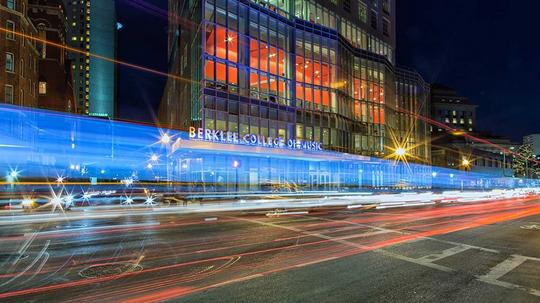
President Roger Brown has one rather ambitious goal for the Berklee College of Music: To become the best institute of contemporary music in the world.
"We need to try and be as innovative as possible," Brown said, "and we need to make investments to support that."
Rather, the school needs to hit its $100 million fundraising goal — the largest effort in Berklee's 69-year history.
Called "Soundbreaking," the campaign is already off to an impressive start, having hit the $57 million mark during its quiet phase, which launched roughly three years ago. The current amount raised has already surpassed the total of Berklee's previous, $54.5 million campaign, dubbed "Giant Steps," which ran from 2006 to 2011.
"We've surprised ourselves with how well we got started," admitted Brown.
The public kick-off of the campaign was celebrated on Thursday at Berklee Night of the Pops, where four of the school's up-and-coming artists opened for famed alumna Melissa Etheridge at Symphony Hall. Prior to the show, Keith Lockhart, the nearly 20-year conductor of the Boston Pops, commended the neighboring school, saying, "What's incredible about Berklee is the incredibly wide variety of talent."
And it's that diversity Brown wants to attract more of with Soundbreaking.
Although half of the target fundraising goal has been earmarked for scholarships and financial aid, a portion of the campaign's proceeds will go toward supporting programs such as Berklee City Music and Amp Up NYC, both designed to make music education accessible for high school students nationwide. Berklee wants to bring contemporary music to more underserved communities and inspire students with the sounds emanating from their own homes, whether hip hop, rock and roll, Latin or metal.
"We're very different from most other colleges in this way," Brown explained, adding how much he "admires MIT for its mathematics and science or Harvard for its natural history and psychology." But, talk to an inner-city high schooler and ask, "Would you rather study psychology or play the music of Marvin Gaye?" and, to Brown, it's a no-brainer.
Berklee has set out to start training talent early, and will be able to award more scholarships with this capital campaign. Through the initiative, low-income students can come to the Downtown Boston school with a heightened self-confidence and knowledge. "When they get to Berklee," Brown added, "they are extremely well-prepared and will out-perform their peers."
Other community outreach programs planned to be offered through the funding include: music therapy, where students can help revive the memories of Alzheimer's patients or use the power of music to help soldiers cope with post-traumatic stress disorder; and Berklee's assistive technology lab for blind and visually impaired students.
Another area slated to receive a monetary boost is online learning — something the school believed in far before it was cool.
Alf Clausen, composer of “The Simpsons,” and seven-time Grammy award-winner Gary Burton both took correspondence courses at Berklee, which involved 26 lessons all via snail mail. "The idea of sharing information widely around the world isn't a new idea to us," Brown said. That's why, when technology was made available to put that information online, the school knew to embrace it.
"We want to be the incubator for the next Passion Pit or Imagine Dragons."
Just under a year ago, Berklee partnered with Southern New Hampshire University to launch the nation's first fully online MBA in Music Business. In mere months, Berklee became the first nonprofit music institution to offer accredited bachelor's degrees online — one in music business and another in music production.
Brown claimed the school has seen success with online learning, because the institution takes a musician-centric approach. Meaning, Berklee puts musicians' needs first and its own second. And what musicians need is access to Berklee's curriculum, whether it's because they're in high school and want to get a leg up on the competition or want to earn a degree while out on tour without compromising their career.
"I am totally confident our small campus of 4,000 musicians will always be filled with people who want to be in that enriched environment," stated Brown, as a means of explaining why he finds residential learning and Berklee Online to be so complimentary.
In the years to come, Berklee will continue developing an array of offerings, from scholarships and online degrees to massive open online courses, all aimed at curbing student debt and making music education more affordable.
"There's probably no field that's subject to disruption and change like music," Brown argued. "Both in good and bad ways."
When something good comes along technologically, it influences music, such as the electric guitar or the invention of the drum set. Innovation can also change how music is made and distributed, however, which has proven to be an assett to fans craving accessibility, but a challenge for more traditional record labels.
To help students prepare for the uncertain future, Berklee launched the Institute for Creative Entrepreneurship in January. The news signaled just the beginning of what Brown deemed a collaboration between Berklee and other Boston-area schools, such as Harvard, MIT, Emerson and Babson. Through BerkleeICE, students will have the opportunity to participate in joint research projects across colleges, as well as enroll in online courses and incubate their startup.
The school is also readying to launch the Berklee Popular Music Institute, which will give students the ability to write, record and mix music, as well as hone in on the kind of YouTube presence they want to have. Brown referenced a variety of famous alumni that have sprung from the school, saying, "We want to be the incubator for the next Passion Pit or Imagine Dragons."
And the Soundbreaking campaign is critical to that. Berklee wasn't named the world's number one music school for nothing.
"We need to challenge ourselves to be more innovative," Brown said. "As much as we love Boston, we need to explain to students why they need to come to Boston instead of going to LA or Hollywood."
Image via Facebook








